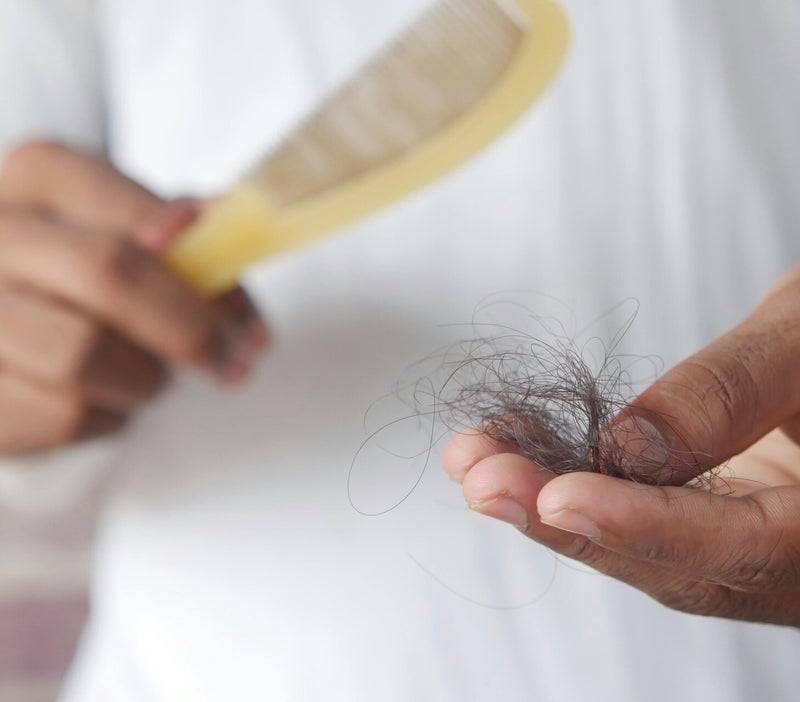
As an acupuncturist, I take a whole-person approach to health. When someone comes to me with hair thinning or hair loss, I don’t just rely on acupuncture treatments alone.
Instead, I take a holistic approach and look deeper — at nutritional deficiencies, hormone balance, thyroid function, and even digestive health.
Together, we explore what your body is trying to tell us and build a personalized plan to support healing from the inside out.
How Acupuncture Can Help
As part of a holistic treatment plan, acupuncture offers a gentle yet effective way to support your body’s natural ability to heal from the inside out. Acupuncture supports hair regrowth because it works by:
- improving circulation
- reducing inflammation
- improving digestion & nutrient absorption
- promoting relaxation & lower stress (common trigger for hair thinning)
The Role of Nutrition
Malnutrition doesn’t just affect those who aren’t eating enough — it’s very common in people eating the standard American diet, which is often high in calories but low in essential nutrients. For hair health, I often recommend:
- Omega-3s (from fish or flax)
- Zinc (from oysters, pumpkin seeds)
- Selenium (from Brazil nuts)
- Collagen and iron (via food or quality supplements)
Because foods like anchovies aren’t on everyone’s plate, I can guide you in choosing effective, digestible supplements.
Many women take Biotin (B7 vitamin) in hopes of improving hair growth. But research shows it only works if you’re actually deficient — and true biotin deficiency is rare. Most people get enough from a balanced diet that includes eggs, nuts, seeds, and whole grains.
Supplementing without a clear need usually has little effect, which is why I look at the full picture rather than relying on a single solution.
Low Ferritin and Hair Loss
One often-overlooked cause of hair loss is low ferritin — the protein that stores iron in your body. Hair regrowth tends to improve once ferritin reaches at least 50 ng/mL. If you haven’t had this test done, I can help you access it through my network or you can ask your doctor.
You can support healthy iron levels naturally with:
- Eat iron-rich foods like grass-fed red meat (if tolerated), spinach, and pumpkin seeds
- Take vitamin C with meals to boost iron absorption
- Use gentle digestive support like enzymes if needed
If diet alone isn’t enough, the right supplement can make a big difference. If your ferritin is still low despite good dietary intake, then there might be other factors contributing, like gut imbalances, heavy menstrual cycles, or low progesterone — all of which I can help investigate.
Thyroid Health and Hair Growth
The thyroid plays a major role in hair health. Even if your TSH is “normal,” you could be experiencing sub-clinical hypothyroidism — a common cause of hair loss, fatigue, brain fog, and weight changes. A full thyroid panel (including Free T3, Free T4, and antibodies) gives a clearer picture. If your provider won’t run these labs, I can help you access and interpret at-home options.
You’re Not Alone — And There Are Solutions
My patient care begins with a comprehensive medical history and lifestyle assessment, allowing me to tailor acupuncture treatments to your specific needs. I include lifestyle recommendations as part of every care plan — whether that means nutrition support, targeted exercises and stretches, or personalized supplement suggestions.
If you’re dealing with hair thinning or other unexplained symptoms, know that you’re not alone — and that there are answers. Let’s talk about how we can get to the root of the issue and create a plan that works for your unique body.
Note: This blog is for educational purposes only and does not replace medical advice. Always consult with a qualified healthcare provider regarding personal health concerns.

